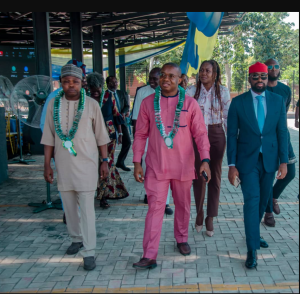

Nkasiobi Oluikpe
At a time when the church is losing its influence and relevance at the global scheme of events, the Redeemed Christian Church of God has embarked on a course of action that would change the narrative and spur other Faith-Based Organisations in the continent of africa.

Recently, the church dedicated its 14-storey City of David Trinity Tower, Oniru, Victoria Island, Lagos. The edifice, said to be built at a cost of over N12 billion, has unique features such as a 4,500 capacity auditorium, a multi-storey car park which can take in 673 cars, rooftop terrace, helipad, automated and integrated lighting, workable sound and video systems.
Other features include: electric car chargers and smart access control among various other modern gadgets; short and long term lease facility for the commercial spaces including a gymnasium and wellness centre, quality medical centre, recreation zone, ATM gallery, A-class restaurant and food court, and much more. It is defined as a complex for religious, work, leisure and play facilities.
The most ennobling part of the project is that proceeds from the rental income is estimated to be in excess of N2 Billion annually. And this whopping amount will be used for the church’s wide range Corporate Social Responsibility programmes and charities.
This has put paid to speculations over the decades about whether the church should be involved in some social actions or not. And most recently, about the level of the church’s involvement in the Sustainable Development Goals. Socially concerned clergies, before now, were usually asked to look elsewhere for social support of their concerns.
And like the Vice President, Prof Yemi Osinbajo, rightly pointed out during the commissioning, the church has a duty of social responsibility to humanity. Jesus, he cited, commanded man to love his neighbours as himself.
True Christian practice does not constitute only in attending Sunday school or weekly study programmes. There are various ways of spreading the message and love of Jesus Christ, one of such is by positively impacting lives in a world fraught in hopelessness, despondence and various forms of ills. This, the Vice President echoes during the commissioning of the edifice: “I am delighted that the RCCG City of David has shown a commitment to spreading love to humanity, as well as the propagation of the gospel of Jesus Christ.”
And just like the Lagos State governor, Babjide Sanwo-Olu revealed, the siting of the edifice at that location in Oniru, Victoria Island, drew the government’s attention to the state of one of the basic infrastructures there, the road. In other words, indirectly complementing the action of the church. “Before now, the road housing the edifice in Oniru was in a dilapidated condition, but since coming on board, we have prioritised all road infrastructures in the state, and here in Oniru, is one out of many we have accomplished,” he said.
Probably, but for the siting of the edifice, the road would have remained in a state of dilapidation till date. But thanks to the Redeemed Christian Church of God, who saw the need to undertake a project whose presence would have a multiplier effect on the host community.
This has also proven that they are living up the tenets of their CSR vision and mission, which states that they set out to be the global model for meeting the ever evolving socio-economic needs as well as express the love of God through visible initiatives that deliver tangible outcomes in societies globally.
They have also contributed to the Sustainable Development Goal 11, which calls for the development of sustainable cities and communities. This, they achieved, by accommodating 14 floors on a single piece of land, utilizing the little available space at their disposal, to achieve a lot, thereby making a significant contribution in easing the miserable housing deficit in the country. Because of the increase in rural-urban migration, which has put so much pressure on available land in the urban cities, there is a global call for builders and developers to go vertical, that is, constructing storey buildings on a single piece of land so as to accommodate more floors, more apartments and more people.
The United Nations has this to say in that regard: “More than half of us live in cities. By 2050, two-thirds of all humanity—6.5 billion people—will be urban. Sustainable development cannot be achieved without significantly transforming the way we build and manage our urban space. The rapid growth of cities—a result of rising populations and increasing migration—has led to a boom in mega-cities, especially in the developing world.
“Making cities sustainable means creating career and business opportunities, safe and affordable housing, and building resilient societies and economies…. creating green public spaces, and improving urban planning and management, in participatory and inclusive ways.”
The RCCG did not only construct a housing edifice, they included a work, leisure, and play facility, which is a way of contributing to making life less stressful and worthy of living, thereby serving as an environmental, ethical and social point of reference to other Faith Based Organisations. To now recall the philanthropic aspect of recycling the projected annual N2bn proceeds from the towers, will be adding an icing to the cake of the entire initiative. This singular CSR act has the tendency to endear the RCCG church to people within their host community, thereby increasing their membership.
The church leadership of other denominations should emulate the actions of the RCCG by ensuring they structure socioeconomic issues and social action more organically into the life of their congregation. That way, besides the church as a corporate body, every individual member of the church will see it as part of their mission and Christian faith to engage in humanitarian activities.
Engaging in Christian Social Responsibility (CSR), as it is now being called in the Christian Faith, does not necessarily imply building a 14-floor edifice like the RCCG just did. There are various other ways that the church and other Faith Based Organisations can assist in the attainment of the Sustainable Development Goals. They are more than anything else, very much positioned to attain these goals which include: SDG1 – no poverty, SDG2 – zero hunger, SDG3 – good health and wellbeing, and SDG4 – quality education.
The church and other Faith Based Organisations should be a beacon of hope to the masses of the people rather than centres of gross exploitation and bondage. The RCCG has shown a good example of what a true Christian denomination should be. Common sense dictates that others should follow suit, irrespective of how small. After all, little drops of water, we are told, make a mighty ocean.











